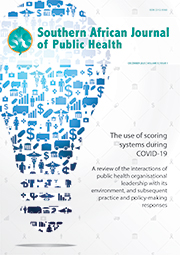Covid-19 Research

HIV and COVID-19 co-infection: Mild infection or prolonged transmission – a case series
Abstract
Background. Comorbid conditions may be associated with severe COVID-19. However, there is no evidence to suggest that people living with HIV have a higher risk of contracting SARS-CoV-2 or, if infected, have more severe disease.
Objective. To describe three patients with HIV and COVID-19 co-infection.
Method. The study was conducted in a private hospital in Gauteng Province, South Africa. All three patients were known to have HIV disease and were treated with chronic antiretroviral medication. All patients admitted to the unit were screened for chronic conditions such as HIV, tuberculosis, diabetes and hypertension. They were admitted to the hospital after being diagnosed with COVID-19, this being confirmed by positive reverse transcription polymerase chain reaction (RT-PCR) tests.
Results. The combination of HIV and SARS-CoV-2 (HIVCO) with comorbidities in case 1 (dialysis-dependent end-stage renal failure and hypertension) resulted in severe illness, a long hospital stay and protracted viral shedding. The protracted shedding pattern (>60 days) was confirmed by multiple positive RT-PCR tests and positive viral cultures obtained after 60 days. Despite comorbidities, case 2 (Takayasu’s disease in remission, dyslipidaemia and previous deep vein thrombosis) and case 3 (hypertension and diabetes) presented with mild illness. The mild clinical course and negative RT-PCR tests in cases 2 and 3 indicated resolution of infection.
Conclusion. Patients with HIVCO and comorbidities may present with mild or severe illness. Unusually long SARS-CoV-2 shedding is a risk for disease transmission, and its association with HIV, other immunocompromised conditions and comorbidities is unclear. We describe a shedding classification that may assist in identifying and managing infectious subsets of patients. Multiple SARS-CoV-2 tests and viral cultures may be necessary to confirm protracted shedding.
Authors' affiliations
J Pillai, Department of Surgery, Faculty of Health Sciences, University of the Witwatersrand, Johannesburg, South Africa
P Motloba, Department of Community Dentistry, Sefako Makgatho Health Sciences University, Pretoria, South Africa
V R Peterson, Cardiovascular Pathophysiology and Genomics Research Unit, School of Physiology, Faculty of Health Sciences, University of the Witwatersrand, Johannesburg, South Africa
K S C Motaung, Department of Biomedical Sciences, Faculty of Science, Tshwane University of Technology, Pretoria, South Africa
L U Ozougwu, Department of Surgery, Faculty of Health Sciences, University of the Witwatersrand, Johannesburg, South Africa
E D Ricci, Fondazione ASIA Onlus, Milan, Italy
P Bonfanti, Department of Infectious Diseases, School of Medicine and Surgery, University of Milano-Bicocca, Italy
D Basu, Department of Public Health Medicine, Steve Biko Academic Hospital and University of Pretoria, South Africa; WHO Collaborating Centre for Social Determinants of Health and Health in All Policies, Pretoria, South Africa
Full Text
Cite this article
Article History
Date published: 2020-12-15
Article Views
Full text views: 1257

.jpg)


Comments on this article
*Read our policy for posting comments here